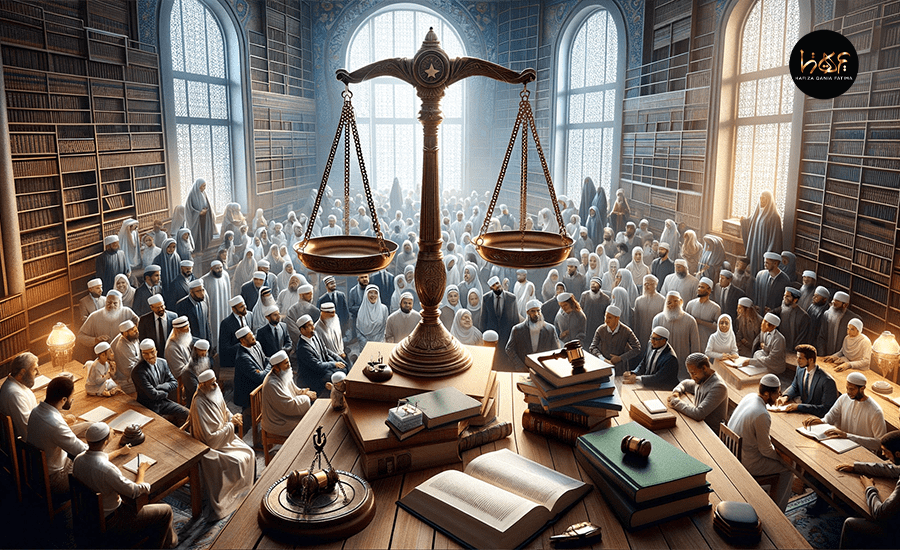
The concept of “Rights of the People in Islam” is an integral part of Islamic teachings, encompassing both the rights owed to Allah عَزَّوَجَلَّ and those owed to fellow human beings. This exploration aims to offer an in-depth understanding of these rights and their profound impact on fostering a just, harmonious, and compassionate Muslim society.
The Fundamental Rights in Islam: A Dual Focus
Islam categorizes rights into two primary types: those due to Allah عَزَّوَجَلَّ and those due to people. This balance between divine and human duties underlines the comprehensive nature of Islamic ethics. The rights of Allah involve worship and obedience, while the rights of people include mutual respect, justice, and fulfilling social obligations.
The Sensitivity of Human Rights in Islam
In Islam, human rights hold great significance. Violating these rights necessitates immediate action, encompassing both repentance to Allah and seeking forgiveness from the wronged individual. This reflects the high value placed on human dignity and justice in Islam.
(Source: Fatawa Razawiyyah, vol. 24, pp. 460)
Prophet Muhammad’s Guidance on Rights
Prophet Muhammad صَلَّى اللهُ تَعَالٰى عَلَيْهِ وَاٰلِهٖ وَسَلَّم emphasized the sanctity of a Muslim’s life, property, and honor. His teachings promote equality, justice, and empathy, illustrating the high standard of moral conduct expected in the Muslim community.
(Source: Sunan Abi Dawood, vol. 4, pp. 354, Hadees 4882; Sahih Muslim, pp. 1394, Hadees 2582)
Advantages of Fulfilling People’s Rights

Fulfilling the rights of others brings numerous advantages in Islam, contributing to societal peace, respect, and harmony. It fosters love and strengthens relationships within the community.
- Peace and Harmony: Fulfilling these rights ensures that each individual receives their due, promoting societal peace and eliminating unrest.
- Increased Respect and Honor: Those who uphold others’ rights gain respect and honor in their community.
- Development of Love and Affection: It nurtures love and strengthens relationships among individuals.
- Protection from Sin: It shields one from the sin of violating others’ rights.
گو یہ بندہ نکمّا ہے بیکار اِس سے لے فضل سے ربِّ غفّار
کام وہ جس میں تیری رِضا ہے یا خدا تجھ سے میری دُعا ہے
صَلُّوۡا عَلَى الۡحَبِيۡب صَلَّى اللّٰهُ تَعَالٰى عَلٰى مُحَمَّد
Consequences of Neglecting Rights
Neglecting or violating people’s rights leads to severe consequences in Islam, including major sins and societal discord. Such actions can lead to spiritual and communal harm, with implications extending into the Hereafter.
- Hurting Others’ Feelings: Not fulfilling these rights can result in the major sin of causing emotional harm to others.
- Paving Way for Negative Emotions: It may lead to jealousy, malice, and hatred, harming societal bonds.
- Opening Doors to Major Sins: Neglecting rights can lead to lying, backbiting, and other harmful behaviors.
- Compensation on the Day of Judgment: Violators must compensate for their actions with good deeds in the Hereafter.
- Bearing Others’ Burdens: Those lacking good deeds will bear the burden of those they have wronged.
- Social Rejection: People generally show aversion towards those who violate others’ rights.
اٰمِيۡن بِجَاهِ النَّبِيِّ الۡاَمِيۡن صَلَّى اللّٰهُ تَعَالٰى عَلَيۡهِ وَاٰلِه وَسَلَّم
صَلُّوۡا عَلَى الۡحَبِيۡب صَلَّى اللّٰهُ تَعَالٰى عَلٰى مُحَمَّد
Conclusion
The “Rights of the People in Islam” are integral to the fabric of Islamic teachings. Upholding these rights is essential for spiritual growth, societal well-being, and maintaining justice and harmony. As Muslims, fulfilling these rights, guided by our faith and the teachings of Prophet Muhammad صَلَّى اللهُ تَعَالٰى عَلَيْهِ وَاٰلِهِ وَسَلَّم, is not just a duty but a path to a righteous and compassionate life
FAQs
Q: What are the essential rights of people in Islam?
A: In Islam, essential rights include the right to life, property, dignity, and justice. These rights are rooted in Quranic teachings and the Sunnah, emphasizing respect and compassion in interpersonal relations.
Q: How do the teachings of Islam emphasize respecting these rights?
A: Islam emphasizes these rights through Quranic verses and the examples set by Prophet Muhammad صَلَّى اللهُ تَعَالٰى عَلَيْهِ وَاٰلِهِ وَسَلَّم. Fulfilling these rights is seen as a reflection of one’s faith and commitment to Allah.
Q: What are the consequences of violating these rights in Islamic teachings?
A: Violating these rights can lead to spiritual decline, social discord, and divine punishment in the Hereafter. Islam urges seeking forgiveness and making amends for such transgressions.
Q: How does fulfilling people’s rights impact the Muslim community?
A: Fulfilling these rights fosters a sense of brotherhood, peace, and stability in the Muslim community. It builds trust, strengthens social bonds, and reflects the compassionate nature of Islamic teachings.
Q: What guidance did Prophet Muhammad صَلَّى اللهُ تَعَالٰى عَلَيْهِ وَاٰلِهِ وَسَلَّم offer regarding these rights?
A: Prophet Muhammad صَلَّى اللهُ تَعَالٰى عَلَيْهِ وَاٰلِهِ وَسَلَّم taught that respecting and fulfilling these rights is essential for a Muslim’s faith. He exemplified this through his actions and sayings, advocating for justice, empathy, and kindness towards all.
Source:
Dawat e Islami